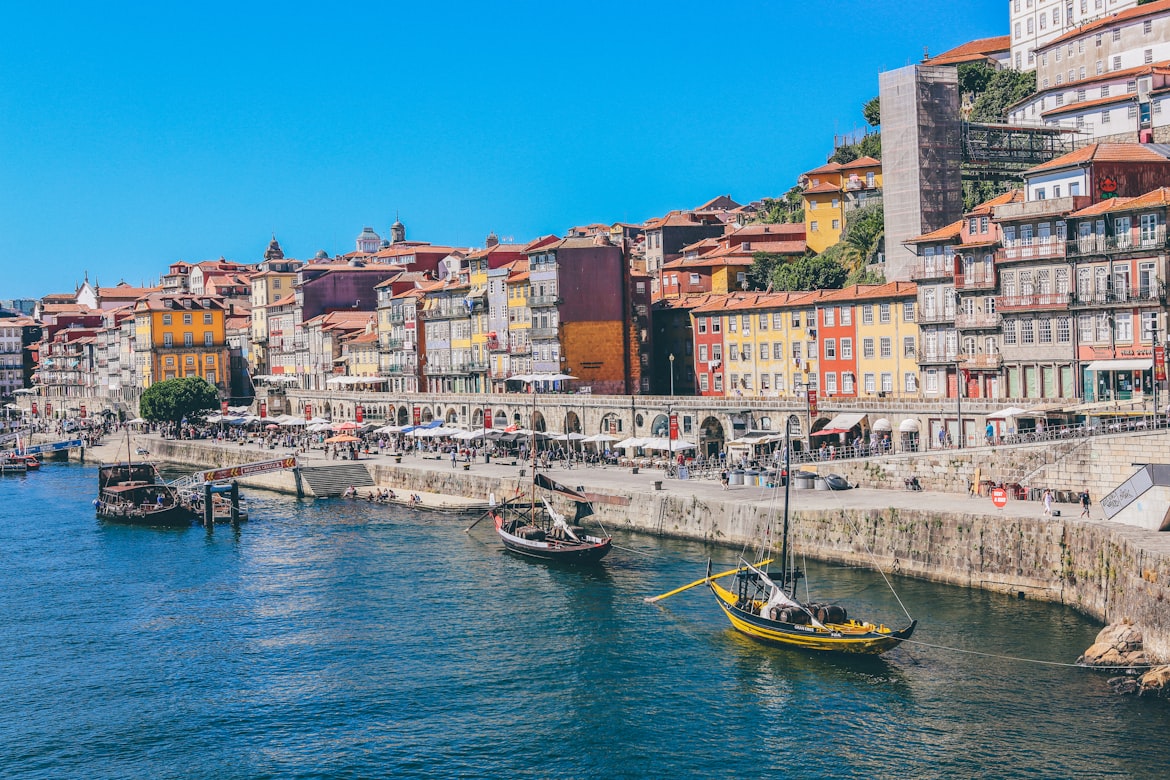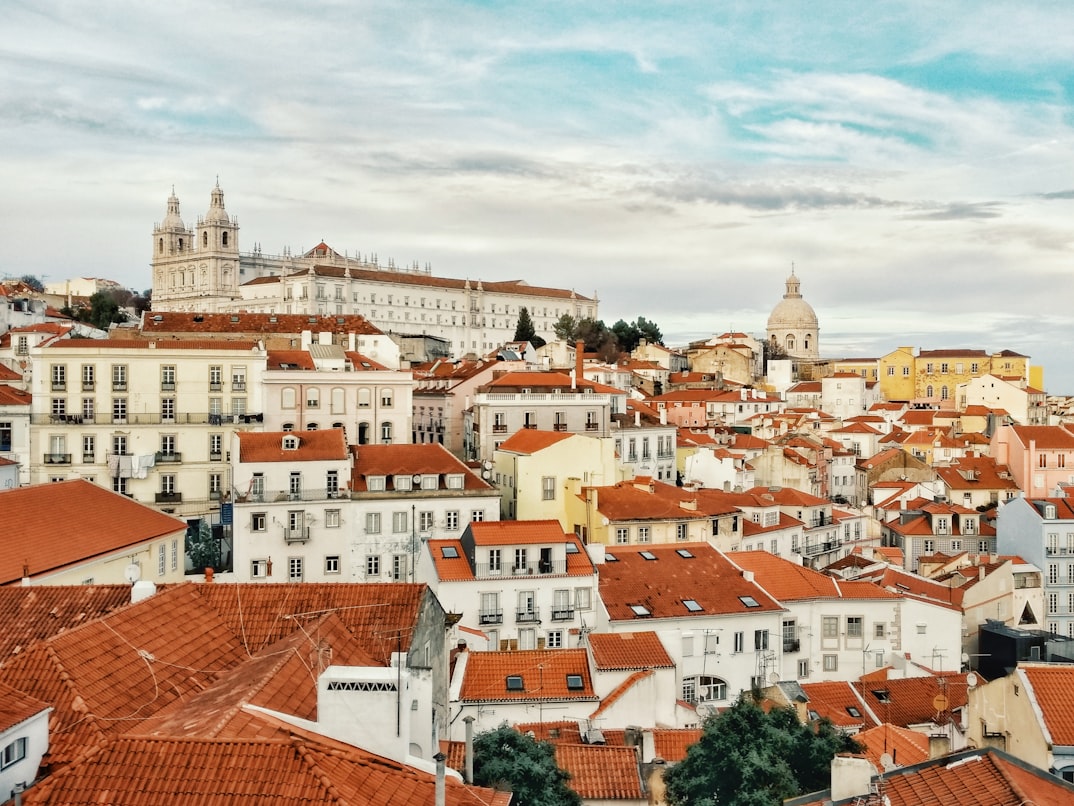Top Attractions
Portugal is packed with captivating sights that span centuries of history and natural beauty. In Lisbon, wander through the cobbled streets of Alfama, admire the intricate stonework of the Jerónimos Monastery, and ride the iconic yellow Tram 28 through old neighborhoods. Nearby, Belém Tower and the Monument to the Discoveries pay homage to Portugal’s maritime legacy. In Sintra, fairy-tale palaces like Pena Palace and Quinta da Regaleira dazzle with their Romantic architecture and mystical gardens. Head north to Porto, where colorful riverside buildings line the Douro River, and wine cellars in Vila Nova de Gaia invite tastings of the country’s world-famous port wine. Nature lovers can explore the rugged cliffs of the Algarve, the volcanic landscapes of the Azores, or the lush, terraced hillsides of Madeira. For a true historical immersion, don’t miss the university town of Coimbra, the medieval village of Óbidos, and the ancient Roman ruins of Conímbriga.
Local Dishes
Portuguese cuisine is deeply rooted in the sea, seasoned with olive oil, garlic, and love. The most iconic dish is bacalhau (salt cod), prepared in dozens of traditional ways, such as bacalhau à Brás or bacalhau com natas. Sardinhas assadas (grilled sardines) are a beloved summertime treat, especially during Lisbon’s Saint Anthony festival. Meat lovers should try leitão à Bairrada (roast suckling pig) or francesinha, a decadent Porto sandwich layered with meats, cheese, and spicy sauce. Caldo verde, a green kale soup with chouriço sausage, offers comfort in a bowl. Sweet tooths are in for a treat with pastéis de nata, the beloved custard tarts with flaky pastry, especially at Pastéis de Belém. In the north, try tripas à moda do Porto for a hearty, historical dish, and pair any meal with a glass of vinho verde or aged Port wine.
Transportation Tips
Portugal’s transportation network is modern, efficient, and traveler-friendly. Comboios de Portugal (CP) runs an extensive train service, connecting major cities like Lisbon, Porto, Coimbra, and Faro. High-speed Alfa Pendular trains are the fastest and most comfortable option for long-distance travel. Buses operated by companies like Rede Expressos fill in gaps for towns not served by train. In cities, public transit includes buses, trams, metro systems (notably in Lisbon and Porto), and funiculars in hilly neighborhoods. Lisboa Viva and Andante cards offer contactless, reloadable fares for local transport. Rideshare apps like Bolt, Uber, and Free Now are widely available. Renting a car is a good option for exploring the Douro Valley, the Alentejo region, or the Algarve coast, but parking in historic centers can be tricky. Ferries connect the mainland with Madeira and the Azores, and many airlines offer short, affordable flights between islands.
Budget Travel Tips
Portugal remains one of Western Europe’s most budget-friendly destinations. Save on meals by dining at tascas and pastelarias, local eateries where you can enjoy generous portions for under €10. Many cities have free walking tours led by knowledgeable guides (tips appreciated), and museums like the National Tile Museum or MAAT often have free entrance days. Travel by regional trains or intercity buses to save on transport costs. Accommodation is affordable, especially if you choose hostels, guesthouses, or Airbnbs outside the peak summer months. Supermarkets and local markets offer affordable groceries for self-catering. Bring a reusable water bottle—Portugal’s tap water is safe and tasty. In Lisbon and Porto, tourist cards like Lisboa Card or Porto Card offer bundled transportation and discounted or free access to top sites.
Safety Info
Portugal consistently ranks as one of the safest countries in the world for travelers. Violent crime is rare, and petty crime, such as pickpocketing, is limited to tourist-heavy areas like trams in Lisbon or Porto’s Ribeira. Always keep an eye on bags and avoid leaving valuables in rental cars. Tap water is safe to drink, and the healthcare system is accessible to tourists if needed. Wildfires can be a risk during very dry summers, especially in central Portugal, so travelers should check local alerts. In rural areas, roads may be narrow and winding—drive cautiously. LGBTQ+ travelers will find Portugal to be progressive and welcoming.
Cultural Etiquette
Portuguese people are warm, courteous, and proud of their traditions. Greetings are polite — expect handshakes or cheek kisses among friends. Titles like “Senhor” and “Senhora” are commonly used to show respect. Punctuality is appreciated in professional settings but more relaxed socially. When dining, it's polite to wait until everyone is served before starting, and tipping (5–10%) is customary though not obligatory. Avoid loud behavior in public places, and don’t assume everyone speaks Spanish — this can be seen as culturally insensitive. Modest dress is appreciated in churches, and when visiting rural villages, a respectful attitude goes a long way.
Travel Style Fit
Portugal is a dream destination for history buffs, foodies, road trippers, and slow travelers. It caters well to solo adventurers with its safe environment and welcoming locals, while couples will find romantic vistas in Sintra, Porto, and the Douro. Luxury seekers can indulge in wine estates and historic hotels, while budget backpackers can easily get by on €40–60 a day. Nature lovers and eco-conscious travelers will thrive in the Azores and Madeira, and the beaches and surf towns of the Algarve attract digital nomads and sunseekers alike. Whether you're seeking culture, coastline, cuisine, or calm — Portugal has a travel style for you.

Best Time to Visit
The best times to visit Portugal are in spring (April to June) and early fall (September to October) when the weather is warm and pleasant, crowds are thinner, and prices are more reasonable. July and August are peak travel months, especially in the Algarve, with hot temperatures and packed beaches. If you're attending festivals like Festas de Lisboa or Festa de São João in Porto, summer offers an electric atmosphere. For wine lovers, September’s harvest season in the Douro Valley is a rewarding experience. Winter months (November to March) are cooler and wetter in the north but mild in the south and in Madeira, making them good for off-season travelers seeking fewer crowds and lower rates.
Accommodation Recommendations
Low-budget travelers will find excellent value in hostels like Selina Secret Garden Lisbon, which offers trendy vibes, rooftop terraces, and co-working spaces, or Gallery Hostel Porto, known for its artistic flair and warm hospitality.
Mid-range travelers can enjoy charming stays at My Story Hotel Ouro in Lisbon, a boutique property in a historic building, or Casa das Laranjas in Porto, which combines comfort with a homely feel near the Douro.
Luxury travelers will find no shortage of opulence in places like Pestana Palace Lisboa, a restored 19th-century palace with lush gardens and indulgent amenities, or The Yeatman Hotel in Porto, a wine-themed luxury resort with panoramic river views, Michelin-starred dining, and a serene spa.
Languages Spoken
The official language is Portuguese, which has a distinctive sound and rhythm compared to its Brazilian counterpart. English is widely spoken in Lisbon, Porto, and major tourist areas, especially among younger generations and in hospitality settings. In rural regions, English proficiency decreases, so learning a few key phrases — like “obrigado/a” (thank you), “por favor” (please), and “bom dia” (good morning) — will be greatly appreciated and warmly received. Spanish is understood to some extent but is not a default second language.
Currency
Portugal uses the euro (€). Credit and debit cards are accepted almost everywhere, though it’s still useful to carry small cash for local markets, bakeries, or rural towns. ATMs (Multibanco) are widespread and reliable, offering favorable exchange rates and services like bill pay and mobile top-up. Avoid Euronet ATMs, which typically charge higher fees. Contactless payment is common, and mobile payment options like Apple Pay and Google Pay are increasingly accepted in urban centers.
Common Traveler Mistakes to Avoid
One mistake travelers often make is overlooking inland regions like the Alentejo or Douro Valley in favor of only coastal cities. Others underestimate the hills in Lisbon — comfortable shoes are essential! Avoid assuming all Portuguese people speak Spanish, and don’t skip the smaller eateries in favor of only touristy restaurants. Some visitors also forget to validate their public transport tickets, which can result in fines. In summer, booking accommodation at the last minute, especially in the Algarve, can leave travelers with limited and expensive options.
Essential Apps & Tools
Moovit and Citymapper are great for navigating urban transport in Lisbon and Porto. Use CP – Comboios de Portugal for train schedules and Rede Expressos for intercity bus routes. Zomato and TheFork help find and book restaurants with user reviews. Google Translate is handy for signage and menus. For surfing and weather updates in the Algarve or Azores, Windy and Magicseaweed are popular. Booking.com, Airbnb, and Hostelworld are widely used for accommodation, while Bolt and Uber simplify local rides.
Suggested Itinerary Styles
A two-week itinerary could start with 3–4 days in Lisbon, exploring historic neighborhoods like Alfama and Bairro Alto, plus a day trip to Sintra. Then take the train to Coimbra to see its stunning university and libraries. Continue north to Porto for 3 days of wine tasting, river walks, and cultural charm. Afterward, head to the Douro Valley for a scenic escape among vineyards. Conclude your trip in the Algarve with 3–4 days of sunshine, exploring Lagos, Benagil Cave, and relaxing beach time. Optional extensions include flights to Madeira for hiking and nature, or the Azores for volcanic lakes and whale watching.
Fun Facts
Portugal is the oldest nation-state in Europe, with its borders virtually unchanged since the 12th century. The country is home to the world’s oldest bookstore, Livraria Bertrand in Lisbon, open since 1732. It also pioneered global exploration during the Age of Discoveries, with Portuguese navigators reaching Brazil, India, and parts of Africa and Asia. Portugal produces over 50% of the world’s cork, and many wine bottles, bags, and even shoes are made from this sustainable material. And did you know Lisbon is built on seven hills, just like Rome? This gives the city its scenic vistas and charming elevation changes.
